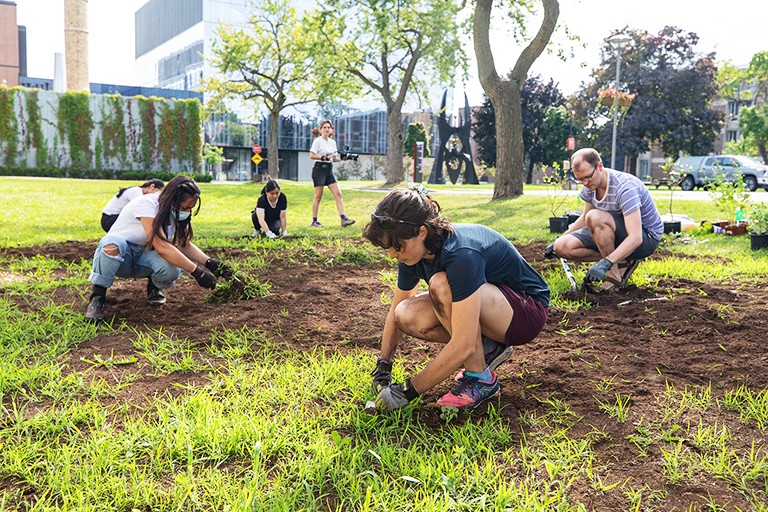Earth Day celebration shines a light on campus biodiversity

What do sculptures, interactive games and panel discussions have in common? They’re all part of the Office of Sustainability’s upcoming Earth Day event at 4TH SPACE on April 22.
This year’s event goes beyond raising awareness — it focuses on driving tangible action. Attendees will have the chance to engage with experts, explore creative exhibits and contribute their ideas to shape Concordia’s conservation initiatives.
The event is also part of the ongoing consultations for the university’s next Sustainability Action Plan, which is likely to feature biodiversity as a key focus area.
“This event is a unique opportunity for the community to directly contribute to biodiversity strategies on campus,” says Jackie Martin, urban agriculture and biodiversity coordinator in the Office of Sustainability. “It marks our first large-scale consultation on this issue.”
Event schedule
The event begins at 11 a.m. with a panel discussion featuring faculty, researchers and sustainability experts. Attendees will learn about biodiversity conservation and explore what actions individuals, institutions and governments can take.
At 12:30 p.m., a short presentation will highlight how Concordia’s Campus Master Plan is shaping biodiversity initiatives on campus.
“A lot of what we envision — many of the targets and strategies — will focus on the campus grounds,” says Dominique Dumont, director of strategic planning and development in Facilities Management. Dumont adds that there is a strong desire to increase green spaces, enhance biodiversity and create more sustainable infrastructure.
From 1 to 3 p.m., interactive biodiversity exhibits will showcase sculptures, poster presentations and a checkers game highlighting native and invasive species.
At 2 p.m., a biodiversity action workshop will allow participants to share their insights and priorities for Concordia’s biodiversity strategy, which will be integrated into the next Sustainability Action Plan.
Supporting biodiversity action
This year’s Earth Day event aligns with Concordia’s recent commitment to the Nature Positive Pledge, a global initiative led by the United Nations and the University of Oxford to encourage biodiversity conservation.
“The pledge requires us to take baseline biodiversity data and set targets we want to hit,” Martin explains. “Then, we have to create action plans to achieve those targets and report on our progress annually.”
Concordia’s biodiversity efforts are already making an impact. Last fall, the university planted more than 1,400 trees at the Loyola Campus.
“The response has been overwhelmingly positive,” Martin says. “People reached out to express gratitude, ask questions and share their experiences. We’ve discovered a thriving community of amateur naturalists eager to get involved.”
The university is also fostering a growing network of researchers and students dedicated to biodiversity conservation. Martin has been working with a group informally known as the Biodiversity Advisory Committee, consisting of faculty and graduate students conducting biodiversity research.
“There’s incredible passion and energy among these researchers,” she says. “They’re excited to see the university formalizing biodiversity efforts and creating a coordinated strategy.”
With Concordia’s Earth Day event set to deepen engagement, Martin hopes attendees will leave with a stronger understanding of biodiversity and a sense of empowerment to act.
“People are still grappling with what biodiversity loss means and how it affects their lives,” she explains. “This event is about building knowledge and showing that — as a university — we are committed to supporting our community in navigating this challenge.”
Take part in the Office of Sustainability’s Earth Day event on April 22. To learn more about biodiversity and urban agriculture, visit Concordia’s dedicated web page.


